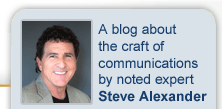It’s a shame that phrase has become so trivialized and impugned because of the circumstances under which it became part of our modern-day vernacular. Otherwise, it could truly serve as a plea for sanity at a time when dialogue between reasonably intelligent, well-intentioned people has veered off into a world of unbelievable disrespect. I’m not the first to comment about the condition of today’s public discourse, and I won’t be the last. Hopefully, however, with some easy-to-apply tips, we all might challenge ourselves to a higher standard.
I was recently asked by a reporter to comment on a situation involving a community planning group and the level of apparent dysfunction they’ve reached, including personal insults, name-calling, nasty emails and the like. The article, “Political infighting plagues Alpine panel,” appeared in The San Diego Union-Tribune and explains the kinds of behaviors that often occur in today’s public arena, whether it’s an advisory group, governmental body, in blog posts in response to news stories, etc.
I recently read somewhere that much of what has happened is that, due to the growth of electronic communications, we’ve learned to treat ‘people’ represented at the end of those communication venues as if they were themselves machines. Unfeeling, unconscious, unaffected machines. Thus, an email isn’t to a person. It’s the pounding away on a keyboard, with all the anger, frustration, ill-will and worse that gets conjured up inside us at times. Were folks sitting in the same room, face-to-face, it might just temper the words we use and the sometimes strength of emotion we use to convey them.
A few questions to ask yourself next time you communicate:
- How would I treat this person if they were my best friend?
- What can I say or do that would actually help in this situation?
- Is it possible I’m not seeing something that might give me a different perspective on the issue?
- What can I learn from someone who doesn’t think like me, doesn’t share my values, life experiences and world-view?
- If I let go of who’s right and who’s wrong, and instead focus on doing the right thing, how does that change my actions and words?
A few tips, many you’ve heard before, however, worth repeating:
1) Stop, take a deep breath (or three) before saying or doing anything. Just this pause alone will give you time to think, maybe even lower your blood pressure and act more kindly and thoughtfully.
2) Consider the difference between a reaction (quick, thoughtless, emotional, gives control and responsibility to the other person, blames, diminishes the likelihood of a resolution to conflicts, etc.) vs. a response (strategic, thoughtful, unemotional, seeks resolutions, puts you in control of your emotions and actions), and seek always a response to events and conflicts.
3) Take FULL responsibility for your part of the interaction and relationship (more on this in another post) instead of blaming or seeking change in the other person.
4) Remember, you are emailing, talking, blogging, tweeting, etc. a REAL HUMAN BEING, a person with feelings, albeit their world-view may be different than yours, they are of the same species, and like you, they mostly want to be heard, understood and appreciated for who they are.
5) Avoid the right/wrong paradigm (if they’re right, I must be wrong and vice versa), and instead, look for the nexus in your ideas; in the case of this story about Alpine, for example, what do we have in common in our love for our community, our vision for the next generation and what they’ll inherit from our hard work and dedication, etc.?
6) Remember, you can’t always be right. Sometimes you have to ask yourself if being right is more important than being happy and protecting your own serenity. After all, being at peace with what’s happening is within your power and it’s your decision, not someone else’s.
Granted, it’s not easy to be the first one to take the high road. However, with a new way of approaching our discourse, perhaps we’ll have healthier discussions, greater self-respect as well as respect for others. If it even nudges us slightly away from the aggressive tone we’ve adopted in our public discourse, won’t it have been worth it?
Interestingly, guess what the most common response is to my comments in this recent article from friends, colleagues and clients who read it! “Can’t you and those who do what you do descend upon Congress and get them to practice this stuff? They really need your help!” Well, we may not be able to do that. What each of us can do, however, is make an individual commitment, and since, as it’s said, ‘we elect the government we deserve,’ perhaps we can make a change in the discourse there, too. It can’t hurt to try.
Tags: abundance, Board Development, boards, change, Coaching, communications training, effective decision making, Facilitation, groups, inspiration, Leadership Development, learning, meeting management, organizational development, social trends, Strategic Communications, Team Building, workplace




